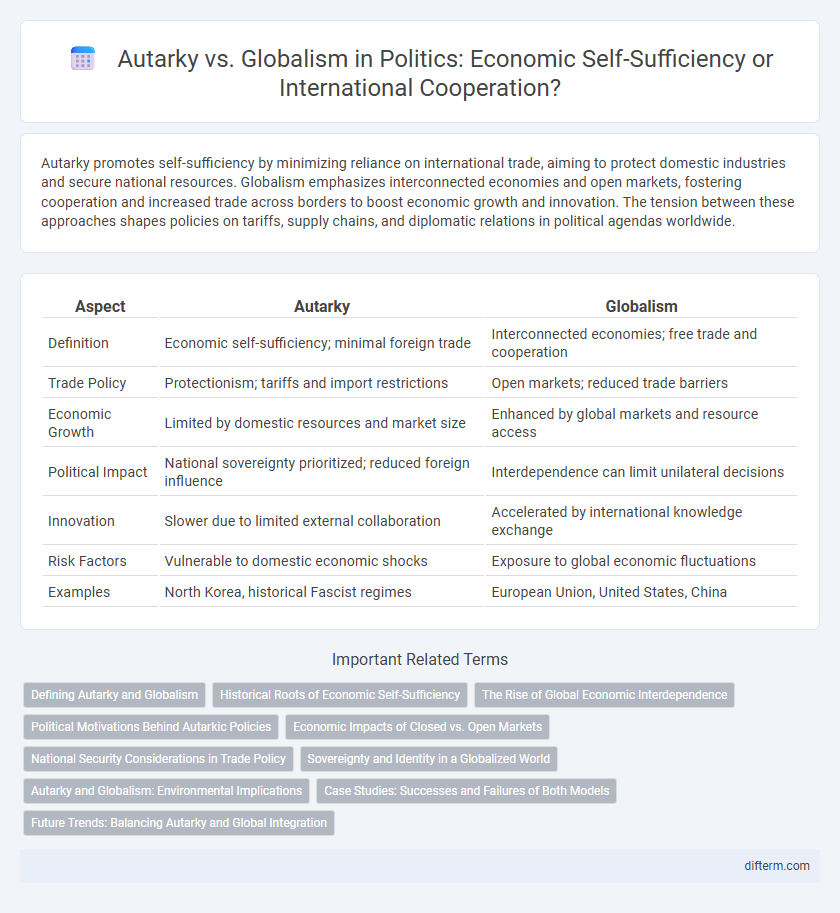Autarky promotes self-sufficiency by minimizing reliance on international trade, aiming to protect domestic industries and secure national resources. Globalism emphasizes interconnected economies and open markets, fostering cooperation and increased trade across borders to boost economic growth and innovation. The tension between these approaches shapes policies on tariffs, supply chains, and diplomatic relations in political agendas worldwide.
Table of Comparison
| Aspect | Autarky | Globalism |
|---|---|---|
| Definition | Economic self-sufficiency; minimal foreign trade | Interconnected economies; free trade and cooperation |
| Trade Policy | Protectionism; tariffs and import restrictions | Open markets; reduced trade barriers |
| Economic Growth | Limited by domestic resources and market size | Enhanced by global markets and resource access |
| Political Impact | National sovereignty prioritized; reduced foreign influence | Interdependence can limit unilateral decisions |
| Innovation | Slower due to limited external collaboration | Accelerated by international knowledge exchange |
| Risk Factors | Vulnerable to domestic economic shocks | Exposure to global economic fluctuations |
| Examples | North Korea, historical Fascist regimes | European Union, United States, China |
Defining Autarky and Globalism
Autarky refers to a national economic policy aimed at achieving self-sufficiency by minimizing dependency on international trade and external resources, emphasizing domestic production and internal markets. Globalism advocates for interconnected economies through free trade, open borders, and multinational cooperation to enhance economic growth, cultural exchange, and political alliances. The contrast between autarky and globalism highlights the tension between sovereignty-focused economic isolationism and integration-driven globalization strategies.
Historical Roots of Economic Self-Sufficiency
Economic self-sufficiency, or autarky, traces its historical roots to mercantilist policies in the 16th and 17th centuries aimed at maximizing national wealth through protectionism and trade barriers. The Great Depression further propelled autarkic tendencies as nations sought to shield domestic industries from global market volatility. Contrastingly, the rise of globalism in the late 20th century emerged from post-World War II economic cooperation frameworks like the Bretton Woods system, promoting free trade and international interdependence.
The Rise of Global Economic Interdependence
Global economic interdependence has intensified as nations increasingly integrate supply chains, financial markets, and technological innovation, reducing the feasibility of strict autarky. The proliferation of international trade agreements, multinational corporations, and digital connectivity underscores the shift toward globalism, promoting economic efficiency and mutual growth. This interconnectedness challenges sovereign economic policies, demanding collaboration to address transnational issues like climate change, pandemics, and financial crises.
Political Motivations Behind Autarkic Policies
Autarkic policies are driven by political motivations such as preserving national sovereignty, reducing dependence on foreign powers, and ensuring economic security amidst geopolitical uncertainties. Governments pursuing autarky often aim to protect domestic industries from global market fluctuations and external political pressures. These policies can serve as strategic tools to strengthen internal control and promote self-reliance in critical sectors like energy, agriculture, and technology.
Economic Impacts of Closed vs. Open Markets
Closed markets under autarky often suffer from limited economic growth due to reduced competition and inefficient resource allocation, resulting in higher production costs and limited consumer choices. Open markets foster economic expansion by enabling access to global supply chains, encouraging innovation, and allowing specialization based on comparative advantage. Empirical data shows countries with liberal trade policies experience higher GDP growth rates and increased foreign direct investment compared to autarkic economies.
National Security Considerations in Trade Policy
Autarky emphasizes self-sufficiency to reduce dependence on foreign nations, aiming to enhance national security by minimizing vulnerabilities in critical supply chains. Globalism promotes international trade openness, fostering economic interdependence which can increase diplomatic leverage but may expose a country to external disruptions and strategic risks. Policymakers balance these approaches by assessing the security implications of supply chain resilience, resource access, and geopolitical stability in trade agreements.
Sovereignty and Identity in a Globalized World
Autarky emphasizes national sovereignty by advocating economic self-sufficiency to protect cultural identity and political autonomy from global influences. Globalism promotes interconnected economies and shared governance structures, challenging traditional state sovereignty but fostering cross-cultural collaboration. Balancing autarkic policies and globalist integration is crucial for maintaining national identity while participating in the global economy.
Autarky and Globalism: Environmental Implications
Autarky limits environmental degradation by reducing reliance on global supply chains, thus minimizing carbon emissions from transportation and promoting local resource management. Globalism fosters international cooperation on climate initiatives, enabling broader implementation of sustainable technologies and shared environmental standards. Both approaches impact carbon footprints and ecological sustainability, with autarky emphasizing localized control and globalism advocating for coordinated global environmental governance.
Case Studies: Successes and Failures of Both Models
Autarky, exemplified by North Korea's rigid economic self-sufficiency, leads to severe resource shortages and international isolation, showcasing its failure in fostering sustainable growth. In contrast, globalism, demonstrated by the European Union's integrated markets and trade policies, has successfully boosted economic development and political cooperation among member states. However, globalism also faces challenges such as economic disparity and loss of national sovereignty, highlighting the complexities of both models in contemporary politics.
Future Trends: Balancing Autarky and Global Integration
Future political trends indicate a nuanced balance between autarky and globalism, where nations increasingly adopt selective self-sufficiency to safeguard critical industries while engaging in strategic global trade partnerships. Emerging technologies in supply chain management and digital economies enable countries to optimize resource allocation without fully abandoning international cooperation. Forecasts suggest policy frameworks will prioritize resilience through diversified imports coupled with regional trade blocs to mitigate geopolitical risks.
Autarky vs Globalism Infographic

 difterm.com
difterm.com